Routine lab tests are not reliable for diagnosing Long COVID, according to a new study. The research found that no clinical lab values could serve as biomarkers, highlighting the need to focus on symptoms for diagnosis.
A new study found that most routine laboratory tests are not reliable for diagnosing Long COVID, also known as Post-Acute Sequelae of SARS-CoV-2 infection (PASC).
The study, published in Annals of Internal Medicine, found no reliable biomarker among 25 routine clinical laboratory values for prior infection, PASC, or specific types of PASC clusters. This suggests none of these routine labs can serve as a clinically useful biomarker of PASC.
“Our study shows patients can have severe Long COVID with normal lab results. This suggests doctors should not focus on the results of blood panels to diagnose Long COVID but should focus more on symptoms and ways to help patients get relief by treating their symptoms,” said the study’s first author, Kristine Erlandson, MD, a professor in the Division of Infectious Diseases at the University of Colorado Anschutz Medical Campus.
Seven percent of all adults in the U.S., nearly 18 million people, currently have long COVID, according to the Agency for Healthcare Research and Quality’s Medical Expenditure Panel Survey.
“Our challenge is to discover biomarkers that can help us quickly and accurately diagnose long COVID to ensure people struggling with this disease receive the most appropriate care as soon as possible,” said David Goff, MD, PhD, director for the Division of Cardiovascular Sciences at the NIH’s National Heart, Lung, and Blood Institute. “Long COVID symptoms can prevent someone from returning to work or school, and may even make everyday tasks a burden, so the ability for rapid diagnosis is key.”
Large-Scale Study and Findings
This study was funded by the National Institutes of Health’s (NIH) Researching COVID to Enhance Recovery (RECOVER) Initiative. The RECOVER initiative includes multiple research studies that involve thousands of participants from across the country. In Colorado, these studies take place at the Colorado Clinical and Translational Sciences Institute (CCTSI) at CU Anschutz.
To investigate clinical laboratory markers of SARS-CoV-2 and PASC, the researchers examined data from nearly 10,000 adults with and without SARS-CoV-2 infection. The researchers recruited from over 80 enrolling sites across 33 U.S. states plus Washington, DC, and Puerto Rico, making it one of the largest and most diverse studies of its kind.
The study compared results in several ways: between participants with and without prior SARS-CoV-2 infection at six months after infection, between participants with and without PASC, and between participants with each of the four most common PASC symptom phenotypes and those unlikely to have PASC.
Modest Differences, But No Clear Biomarkers
They found participants with prior SARS-CoV-2 infection showed modest increases in HbA1c (a marker of long-term blood sugar levels) and urinary albumin-to-creatinine ratio (uACR), along with small decreases in platelet counts.
“While these differences are statistically significant, these associations are generally small and not reliable enough to serve as diagnostic biomarkers for PASC,” Erlandson says.
The researchers suggest this data shows the complexity of PASC as a condition that may involve multiple physiological pathways beyond simple laboratory markers, such as those for inflammation, anemia, or other markers.
“Long COVID has been very elusive; numerous possible symptoms, no definite cause, and no clear treatment. We hear from patients that their concerns are dismissed by providers because their lab tests are normal. In this study, even the exhaustive list of routine blood tests could not help in making a PASC diagnosis. This is an important observation in PASC research as prior smaller studies showed inconsistent abnormalities in some blood tests. Until a reliable biomarker is found, the best diagnostic modality for PASC remains the old-fashioned history taking and clinical assessment,” Grace McComsey, MD, senior author of the paper, professor and vice dean of clinical and translational research at Case Western Reserve University.
The researchers also note that it’s still important to do routine laboratory tests to rule out other conditions during the process of diagnosing PASC.
Reference: “Differentiation of Prior SARS-CoV-2 Infection and Postacute Sequelae by Standard Clinical Laboratory Measurements in the RECOVER Cohort” by Kristine M. Erlandson, Linda N. Geng, Caitlin A. Selvaggi, Tanayott Thaweethai, Peter Chen, Nathan B. Erdmann, Jason D. Goldman, Timothy J. Henrich, Mady Hornig, Elizabeth W. Karlson, Stuart D. Katz, C. Kim, Sushma K. Cribbs, Adeyinka O. Laiyemo, Rebecca Letts, Janet Y. Lin, Jai Marathe, Sairam Parthasarathy, Thomas F. Patterson, Brittany D. Taylor, Elizabeth R. Duffy, Monika Haack, Boris Julg, Gabrielle Maranga, Carla Hernandez, Nora G. Singer, Jenny Han, Priscilla Pemu, Hassan Brim, Hassan Ashktorab, Alexander W. Charney, Juan Wisnivesky, Jenny J. Lin, Helen Y. Chu, Minjoung Go, Upinder Singh, Emily B. Levitan, Paul A. Goepfert, Janko Ž. Nikolich, Harvey Hsu, Michael J. Peluso, J. Daniel Kelly, Megumi J. Okumura, Valerie J. Flaherman, John G. Quigley, Jerry A. Krishnan, Mary Beth Scholand, Rachel Hess, Torri D. Metz, Maged M. Costantine, Dwight J. Rouse, Barbara S. Taylor, Mark P. Goldberg, Gailen D. Marshall, Jeremy Wood, David Warren, Leora Horwitz, Andrea S. Foulkes and Grace A. McComsey, 13 August 2024, Annals of Internal Medicine.
DOI: 10.7326/M24-0737
News
Breakthrough Drug Restores Vision: Researchers Successfully Reverse Retinal Damage
Blocking the PROX1 protein allowed KAIST researchers to regenerate damaged retinas and restore vision in mice. Vision is one of the most important human senses, yet more than 300 million people around the world are at [...]
Differentiating cancerous and healthy cells through motion analysis
Researchers from Tokyo Metropolitan University have found that the motion of unlabeled cells can be used to tell whether they are cancerous or healthy. They observed malignant fibrosarcoma cells and [...]
This Tiny Cellular Gate Could Be the Key to Curing Cancer – And Regrowing Hair
After more than five decades of mystery, scientists have finally unveiled the detailed structure and function of a long-theorized molecular machine in our mitochondria — the mitochondrial pyruvate carrier. This microscopic gatekeeper controls how [...]
Unlocking Vision’s Secrets: Researchers Reveal 3D Structure of Key Eye Protein
Researchers have uncovered the 3D structure of RBP3, a key protein in vision, revealing how it transports retinoids and fatty acids and how its dysfunction may lead to retinal diseases. Proteins play a critical [...]
5 Key Facts About Nanoplastics and How They Affect the Human Body
Nanoplastics are typically defined as plastic particles smaller than 1000 nanometers. These particles are increasingly being detected in human tissues: they can bypass biological barriers, accumulate in organs, and may influence health in ways [...]
Measles Is Back: Doctors Warn of Dangerous Surge Across the U.S.
Parents are encouraged to contact their pediatrician if their child has been exposed to measles or is showing symptoms. Pediatric infectious disease experts are emphasizing the critical importance of measles vaccination, as the highly [...]
AI at the Speed of Light: How Silicon Photonics Are Reinventing Hardware
A cutting-edge AI acceleration platform powered by light rather than electricity could revolutionize how AI is trained and deployed. Using photonic integrated circuits made from advanced III-V semiconductors, researchers have developed a system that vastly [...]
A Grain of Brain, 523 Million Synapses, Most Complicated Neuroscience Experiment Ever Attempted
A team of over 150 scientists has achieved what once seemed impossible: a complete wiring and activity map of a tiny section of a mammalian brain. This feat, part of the MICrONS Project, rivals [...]
The Secret “Radar” Bacteria Use To Outsmart Their Enemies
A chemical radar allows bacteria to sense and eliminate predators. Investigating how microorganisms communicate deepens our understanding of the complex ecological interactions that shape our environment is an area of key focus for the [...]
Psychologists explore ethical issues associated with human-AI relationships
It's becoming increasingly commonplace for people to develop intimate, long-term relationships with artificial intelligence (AI) technologies. At their extreme, people have "married" their AI companions in non-legally binding ceremonies, and at least two people [...]
When You Lose Weight, Where Does It Actually Go?
Most health professionals lack a clear understanding of how body fat is lost, often subscribing to misconceptions like fat converting to energy or muscle. The truth is, fat is actually broken down into carbon [...]
How Everyday Plastics Quietly Turn Into DNA-Damaging Nanoparticles
The same unique structure that makes plastic so versatile also makes it susceptible to breaking down into harmful micro- and nanoscale particles. The world is saturated with trillions of microscopic and nanoscopic plastic particles, some smaller [...]
AI Outperforms Physicians in Real-World Urgent Care Decisions, Study Finds
The study, conducted at the virtual urgent care clinic Cedars-Sinai Connect in LA, compared recommendations given in about 500 visits of adult patients with relatively common symptoms – respiratory, urinary, eye, vaginal and dental. [...]
Challenging the Big Bang: A Multi-Singularity Origin for the Universe
In a study published in the journal Classical and Quantum Gravity, Dr. Richard Lieu, a physics professor at The University of Alabama in Huntsville (UAH), which is a part of The University of Alabama System, suggests that [...]
New drug restores vision by regenerating retinal nerves
Vision is one of the most crucial human senses, yet over 300 million people worldwide are at risk of vision loss due to various retinal diseases. While recent advancements in retinal disease treatments have [...]
Shingles vaccine cuts dementia risk by 20%, new study shows
A shingles shot may do more than prevent rash — it could help shield the aging brain from dementia, according to a landmark study using real-world data from the UK. A routine vaccine could [...]





















